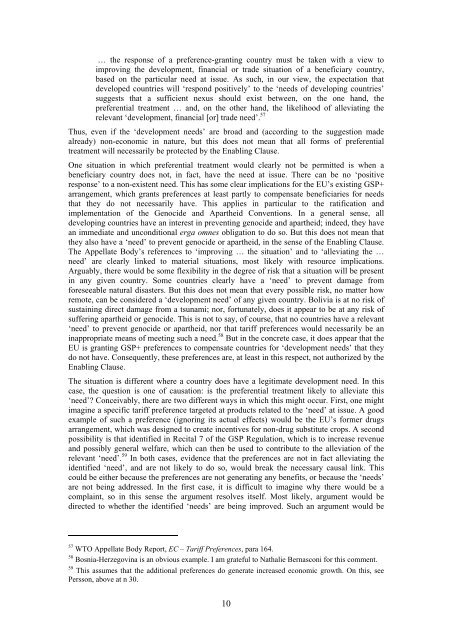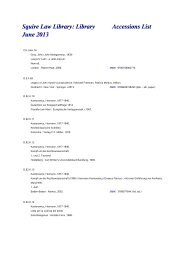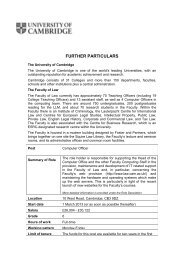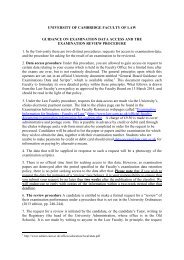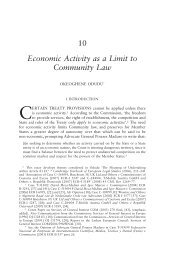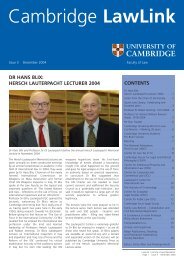The WTO legality of the EU's GSP+ arrangement Dr Lorand Bartels ...
The WTO legality of the EU's GSP+ arrangement Dr Lorand Bartels ...
The WTO legality of the EU's GSP+ arrangement Dr Lorand Bartels ...
Create successful ePaper yourself
Turn your PDF publications into a flip-book with our unique Google optimized e-Paper software.
… <strong>the</strong> response <strong>of</strong> a preference-granting country must be taken with a view toimproving <strong>the</strong> development, financial or trade situation <strong>of</strong> a beneficiary country,based on <strong>the</strong> particular need at issue. As such, in our view, <strong>the</strong> expectation thatdeveloped countries will ‘respond positively’ to <strong>the</strong> ‘needs <strong>of</strong> developing countries’suggests that a sufficient nexus should exist between, on <strong>the</strong> one hand, <strong>the</strong>preferential treatment … and, on <strong>the</strong> o<strong>the</strong>r hand, <strong>the</strong> likelihood <strong>of</strong> alleviating <strong>the</strong>relevant ‘development, financial [or] trade need’. 57Thus, even if <strong>the</strong> ‘development needs’ are broad and (according to <strong>the</strong> suggestion madealready) non-economic in nature, but this does not mean that all forms <strong>of</strong> preferentialtreatment will necessarily be protected by <strong>the</strong> Enabling Clause.One situation in which preferential treatment would clearly not be permitted is when abeneficiary country does not, in fact, have <strong>the</strong> need at issue. <strong>The</strong>re can be no ‘positiveresponse’ to a non-existent need. This has some clear implications for <strong>the</strong> EU’s existing <strong>GSP+</strong><strong>arrangement</strong>, which grants preferences at least partly to compensate beneficiaries for needsthat <strong>the</strong>y do not necessarily have. This applies in particular to <strong>the</strong> ratification andimplementation <strong>of</strong> <strong>the</strong> Genocide and Apar<strong>the</strong>id Conventions. In a general sense, alldeveloping countries have an interest in preventing genocide and apar<strong>the</strong>id; indeed, <strong>the</strong>y havean immediate and unconditional erga omnes obligation to do so. But this does not mean that<strong>the</strong>y also have a ‘need’ to prevent genocide or apar<strong>the</strong>id, in <strong>the</strong> sense <strong>of</strong> <strong>the</strong> Enabling Clause.<strong>The</strong> Appellate Body’s references to ‘improving … <strong>the</strong> situation’ and to ‘alleviating <strong>the</strong> …need’ are clearly linked to material situations, most likely with resource implications.Arguably, <strong>the</strong>re would be some flexibility in <strong>the</strong> degree <strong>of</strong> risk that a situation will be presentin any given country. Some countries clearly have a ‘need’ to prevent damage fromforeseeable natural disasters. But this does not mean that every possible risk, no matter howremote, can be considered a ‘development need’ <strong>of</strong> any given country. Bolivia is at no risk <strong>of</strong>sustaining direct damage from a tsunami; nor, fortunately, does it appear to be at any risk <strong>of</strong>suffering apar<strong>the</strong>id or genocide. This is not to say, <strong>of</strong> course, that no countries have a relevant‘need’ to prevent genocide or apar<strong>the</strong>id, nor that tariff preferences would necessarily be aninappropriate means <strong>of</strong> meeting such a need. 58 But in <strong>the</strong> concrete case, it does appear that <strong>the</strong>EU is granting <strong>GSP+</strong> preferences to compensate countries for ‘development needs’ that <strong>the</strong>ydo not have. Consequently, <strong>the</strong>se preferences are, at least in this respect, not authorized by <strong>the</strong>Enabling Clause.<strong>The</strong> situation is different where a country does have a legitimate development need. In thiscase, <strong>the</strong> question is one <strong>of</strong> causation: is <strong>the</strong> preferential treatment likely to alleviate this‘need’? Conceivably, <strong>the</strong>re are two different ways in which this might occur. First, one mightimagine a specific tariff preference targeted at products related to <strong>the</strong> ‘need’ at issue. A goodexample <strong>of</strong> such a preference (ignoring its actual effects) would be <strong>the</strong> EU’s former drugs<strong>arrangement</strong>, which was designed to create incentives for non-drug substitute crops. A secondpossibility is that identified in Recital 7 <strong>of</strong> <strong>the</strong> GSP Regulation, which is to increase revenueand possibly general welfare, which can <strong>the</strong>n be used to contribute to <strong>the</strong> alleviation <strong>of</strong> <strong>the</strong>relevant ‘need’. 59 In both cases, evidence that <strong>the</strong> preferences are not in fact alleviating <strong>the</strong>identified ‘need’, and are not likely to do so, would break <strong>the</strong> necessary causal link. Thiscould be ei<strong>the</strong>r because <strong>the</strong> preferences are not generating any benefits, or because <strong>the</strong> ‘needs’are not being addressed. In <strong>the</strong> first case, it is difficult to imagine why <strong>the</strong>re would be acomplaint, so in this sense <strong>the</strong> argument resolves itself. Most likely, argument would bedirected to whe<strong>the</strong>r <strong>the</strong> identified ‘needs’ are being improved. Such an argument would be57 <strong>WTO</strong> Appellate Body Report, EC – Tariff Preferences, para 164.58 Bosnia-Herzegovina is an obvious example. I am grateful to Nathalie Bernasconi for this comment.59 This assumes that <strong>the</strong> additional preferences do generate increased economic growth. On this, seePersson, above at n 30.10


